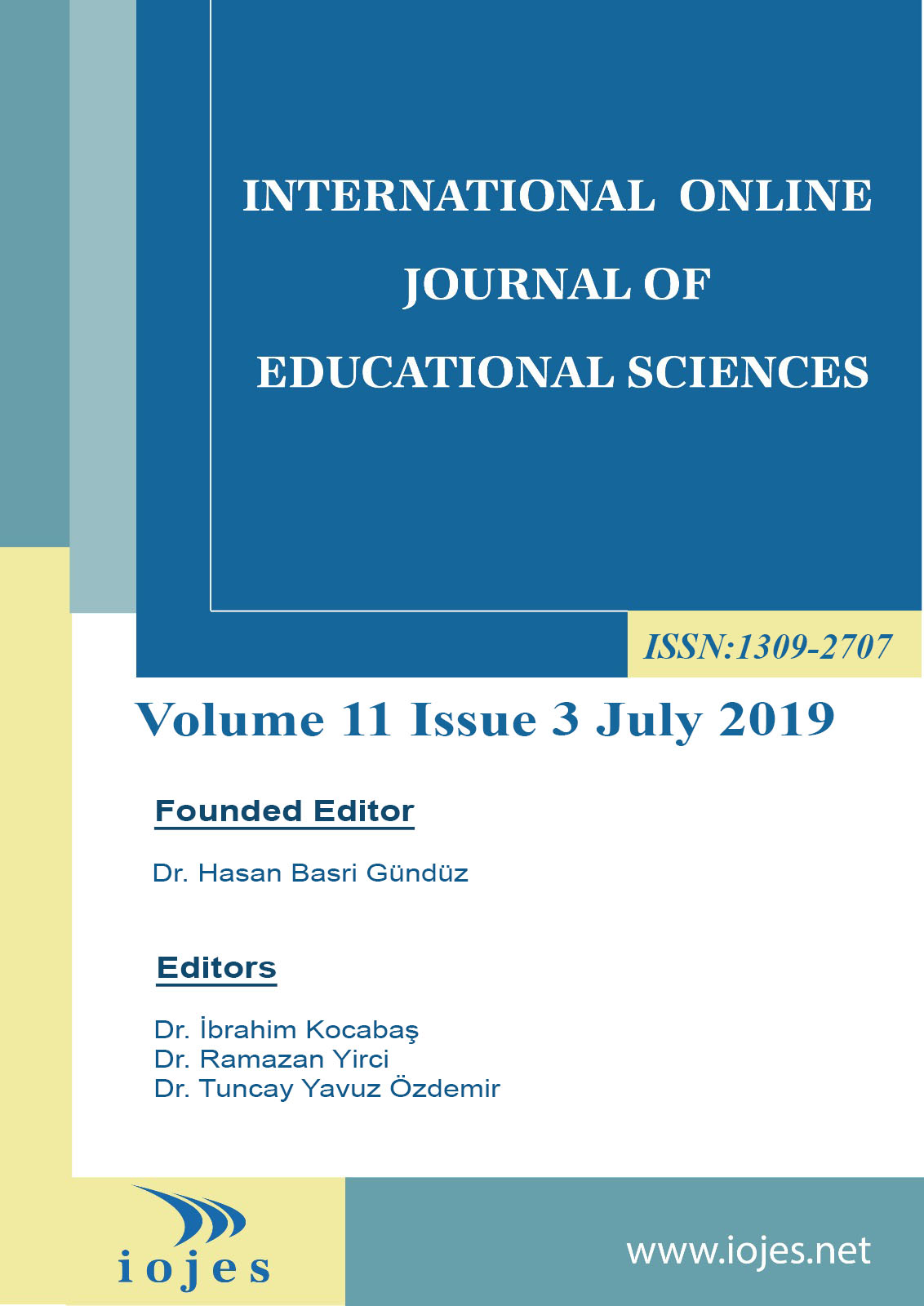Moral Values in school textbooks during the Second Constitution and Early Republican Periods: The case of ‘The Lectures on Morality (Musâhabât-ı Ahlâkiye)'
Author :
Abstract
Keywords
Abstract
The civics class; Lectures on Morality and Civilization (Musâhabât-ı Ahlâkiye ve Medeniye) can be considered as one the fundamental ingredient for classes taught in Turkey such as Human Rights, Citizenship and Democracy, Life Skills and Social Sciences. The main aim of the article is to analyze the moral values that are depicted in two textbooks entitled ‘Lectures on Morality’ belonging to two consecutive periods; first printed in 1333 (1917) during the Constitutional Period (1908-1918) and the latter printed in 1339 (1923) in the early days of the Turkish Republic. This research uses qualitative methodology, focusing on content analysis of these textbooks: “The New Lectures on Morality, Religion, Civilization and History” and “The New Lectures on Morality and Civilization with Illustrations.” The article asserts that the textbooks adopted a moral approach based on “sense of duty”, and explains that a moral person needs first and foremost ‘religious morality’ which is instrumental in the foundation and strengthening of moral values. That said, a person also needs to embody individual moral values that include health, cleanliness, simplicity, prudence, righteousness, self-respect, modesty, courage, cool-headedness, patience, self-confidence, entrepreneurship, tidiness and protection of life. The morals of social duties have been understood as part of duties towards humanity and are discussed under social morality. In the textbooks, social life has been seen through a functionalist approach that values social cohesion and advocates the idea of living together in a society that requires respect to human rights and knowledge on the value of helping each other, and sustaining interpersonal relations according to civilized behavior.
Keywords
- Akagündüz, Ü. (2015). II. Meşrutiyet döneminde kadın olmak. İstanbul: Yeni İnsan Yayınevi.
- Akyüz, Y. (2011). Osmanlı döneminden cumhuriyete geçilirken eğitim-öğretim alanında yaşanan dönüşümler. Pegem Eğitim ve Öğretim Dergisi, 1(2), 9-22.
- Akyüz, Y. (2018). Türk eğitim tarihi. Ankara: Pegem Akademi.
- Alabaş, R. (2018). Cumhuriyet’in ilk yıllarında ilk mekteplerde insani ve toplumsal değerler eğitimi: Resimli, Yeni Musâhabât-ı Ahlâkiye ve Medeniye ders kitabı örneği. Çağdaş Türkiye Tarihi Araştırmaları Dergisi, 18(36), 55-87.
- Alkan, M. Ö. (2008). Osmanlı İmparatorluğu’nda modernleşme ve eğitim. Türkiye Araştırmaları Literatür Dergisi, 6(12), 9-84.
- Alkan, M. Ö. (2014). Militarist Turkish-Islamic synthesis: Official ideology, official history and nationalism in the Second Constitutional Period. Turkish Journal of Middle Eastern Studies, 1(2), 147-172.
- Ayhan, H. (2000). Cumhuriyet dönemi din eğitimine genel bir bakış: Atatürk'ün İslam dini ve din eğitimi hakkındaki görüşleri. M.Ü. İlahiyat Fakültesi Dergisi, 18, 5-27.
- Batır, B. (2007). İkinci Meşrutiyet’ten Tevhid-i Tedrisat’a Türkiye’de ilköğretim (1908- 1924), Doktora Tezi. İstanbul Üniversitesi, Atatürk İlkeleri ve İnkılâp Tarihi Enstitüsü, İstanbul.
- Bayraktar, M. F. (2015). Son dönem Osmanlı ahlâk terbiyecilerinden Ali Seydi Bey, İ. Kurt ve S. A. Tüz (Yay. Haz.) Son dönem Osmanlı ahlâk terbiyecileri ve ahlak terbiyesi içinde (ss.181-198). İstanbul: Ensar Neşriyat.
- Berkes, N. (2006). Türkiye’de çağdaşlaşma. ed. by Ahmet Kuyaş. İstanbul: Yapı Kredi Yayınları.
- Bowen, G. A. (2009). Document analysis as a qualitative research method. Qualitative Research Journal, 9(2), p.27-40.
- Cicioğlu, H. (1985). Türkiye Cumhuriyeti’nde ilk ve ortaöğretim (tarihi gelişimi). Ankara: Ankara Üniversitesi Eğitim Bilimleri Fakültesi Yayınları.
- Doğan, N.(1994). Ders kitapları ve sosyalleşme (1876-1918). İstanbul: Bağlam Yayıncılık.
- Erdem, H. (2006). Son devir Osmanlı düşüncesinde ahlak. İstanbul: DEM Yayınları.
- Ergün, M. (1996). II. Meşrutiyet devrinde eğitim hareketleri (1908-1914). Ankara: Ocak Yayınları.
- Fichter, J. (2001). Sosyoloji nedir?. (N. Çelebi, Çev.). Ankara: Atilla Kitapevi.
- Gurbetoğlu, A. (2007). II. Meşrutiyet dönemi çocuk dergilerinde ahlak eğitimi ve ahlaki değerler (1908–1918). Yüzüncü Yıl Üniversitesi, Eğitim Fakültesi Dergisi, 4(1), 81-101.
- Güngör, E. (1997). Ahlâk psikolojisi ve sosyal ahlâk. İstanbul: Ötüken Neşriyat.
- Güven, İ. (2014). Türk eğitim tarihi. Ankara: Pegem Akademi.
- Kamer, T. & Alabaş, R. (2017). Ahlâk terbiyesi kongresi ve basına yansımaları, Kastamonu Eğitim Dergisi, 25(2), 821-848.
- Meydan, H. (2015). Zeynizâde Mehmet Hâzık, İ. Kurt ve S. A. Tüz (Yay. Haz.) Son dönem Osmanlı ahlâk terbiyecileri ve ahlak terbiyesi içinde (ss.113-148). İstanbul: Ensar Neşriyat.
- Nurdoğan, A. M. (2014). II. Abdülhamid döneminde ilköğretim okullarındaki ders kitapları ve tarih öğretimi. Türk Tarih Eğitimi Dergisi, 3(2), 82-111.
- Oruç, Ş. (2007). Osmanlı’nın son döneminde eğitim uygulamalarında yer alan buluş yöntemi ve bu yöntemle yapılmış bir ders örneği. Türkiye Sosyal Araştırmalar Dergisi, 2, 139-164.
- Özalp, R. (1982). Milli eğitimle ilgili mevzuat (1857-1923). İstanbul: Milli Eğitim Basımevi.
- Özkan, R. & Soylu, A. (2014). Eğitim fakültesi öğrencilerinin benimsedikleri temel insani değerler (Niğde il örneği). Turkish Studies International Periodical for the Languages, Literature and History of Turkish or Turkic. 9(2), 1253-126.
- Pehlivan Ağırakça, G. (2013). Mekteplerde ahlâk eğitim ve öğretimi (1839-1923). İstanbul: Çamlıca Yayınları.
- Şanal, M. (2001). Mustafa Sâtı Bey’in öğretmenlere önermiş olduğu öğretim yöntemleri, Erciyes Üniversitesi Sosyal Bilimler Enstitüsü Dergisi, 11, 309-323.
- Ülken, H. Z. (1958). Felsefeye giriş ikinci kısım. Ankara: Ankara Üniversitesi İlahiyat Fakültesi Yayınları.
- Ülken, H. Z. (1969). Sosyoloji sözlüğü. İstanbul: Milli Eğitim Basımevi.
- Üstel, F. (2014). Makbul vatandaşın peşinde II. Meşrutiyet’ten bugüne vatandaşlık eğitimi. İstanbul: İletişim.
- Yazıbaşı, M. A. (2014). II. Meşrutiyet dönemi sıbyan/ibtidai ve rüştiye mekteplerinde ahlak eğitimi ve öğretimi. Doktora tezi. Ankara Üniversitesi, Sosyal Bilimler Enstitüsü, Ankara.
- Yazıbaşı, M. A. (2018). Son dönem Osmanlı ahlak risalelerinde öne çıkan değerler (1908-1918). Amasya Üniversitesi İlahiyat Fakültesi Dergisi, 6(10), 347-363.
- Yıldırım, A. & Şimşek, H. (2013). Sosyal bilimlerde nitel araştırma yöntemleri. Ankara: Seçkin.
- Yinilmez Akagündüz, S. (2017). II. Meşrutiyet dönemi ahlak eğitimine örnek bir ders kitabı: İbtidailere Malumat-ı Ahlakiyye ve Medeniyye, Kesit Akademi Dergisi, 7, 240-257.





